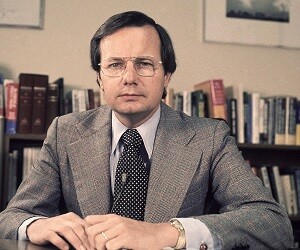

Last Updated: 27 Jun, 2025 | Views: 995
Age: 91
Profession: Journalist
Other Profession(s): Television Producer, Political Commentator
Famous For: White House Press Secretary from 1965 to 1967.
Higher Education: University of Edinburgh, Southwestern Baptist Theological Seminary (MDiv)
About (Profile/Biography):
Bill Moyers stands as one of America's most distinguished journalists and public intellectuals. Born in 1934 in Oklahoma, he has shaped American media discourse for over six decades. Moyers seamlessly transitioned from politics to journalism, serving as White House Press Secretary under Lyndon Johnson before becoming a pioneering television journalist. His work spans investigative reporting, documentary filmmaking, and thoughtful commentary on democracy, religion, and social justice issues.
Early Life and Education of Bill Moyers
• Billy Don Moyers grew up in a working-class family in Marshall, Texas, where his father worked as a laborer and his mother was a homemaker.
• He earned his bachelor's degree from the University of Texas at Austin in 1956, where Bill was editor of the student newspaper and active in campus politics.
• Moyers received a divinity degree from Southwestern Baptist Theological Seminary in 1959, originally planning to become a Baptist minister before politics called.
Political Career of Bill Moyers
• Bill served as Deputy Director of the Peace Corps from 1961-1963, helping establish the program under President Kennedy's administration.
• He became White House Press Secretary under Lyndon Johnson from 1965-1967, making him one of the youngest people to hold this prestigious position.
• Moyers played a crucial role in Johnson's Great Society programs, though he later distanced himself from the Vietnam War escalation policies.
Journalism Career of Bill Moyers
• Bill began his television journalism career at CBS in 1967, where he produced documentaries on social issues and hosted various news programs.
• He created and hosted "Bill Moyers' Journal" on PBS from 1971-1981 and again from 1986-1988, earning acclaim for in-depth interviews and analysis.
• Moyers founded Public Affairs Television in 1987, producing award-winning documentaries on topics ranging from mythology to environmental issues.
Major Controversies around Bill Moyers
• Bill faced criticism for his role in the Johnson administration's surveillance of civil rights leaders and anti-war protesters during the 1960s.
• He sparked controversy with his 1988 documentary "The Secret Government," which exposed covert CIA operations and faced significant political backlash.
• Moyers drew fire from conservatives for his criticism of the Iraq War and his perceived liberal bias in political commentary throughout his career.
Awards and Recognition received by Bill Moyers
• Bill received over 30 Emmy Awards for his outstanding contributions to television journalism and documentary filmmaking throughout his distinguished career.
• He was honored with the Presidential Medal of Freedom in 2000, the nation's highest civilian award, for his contributions to American democracy.
• Moyers received numerous journalism awards including the Peabody Award, duPont-Columbia Award, and was inducted into the Television Academy Hall of Fame.
Lesser-Known Facts about Bill Moyers
• Bill originally planned to become a Baptist preacher and even served as a seminary student pastor before entering politics and journalism.
• He secretly recorded conversations in the White House for President Johnson, tapes that later became valuable historical documents for researchers.
• Moyers is an accomplished author who has written several books on democracy, religion, and American culture beyond his television work.
Legacy and Impact of Bill Moyers
• Bill Moyers transformed television journalism by proving that serious, thoughtful programming could attract and maintain substantial audiences on public television.
• He mentored countless journalists and producers, establishing a standard for ethical journalism that emphasizes truth-telling over sensationalism.
• Moyers continues to influence public discourse through his writing and speaking, remaining an active voice for democratic values well into his nineties.
Wait!
Here're some popular profiles for you.


